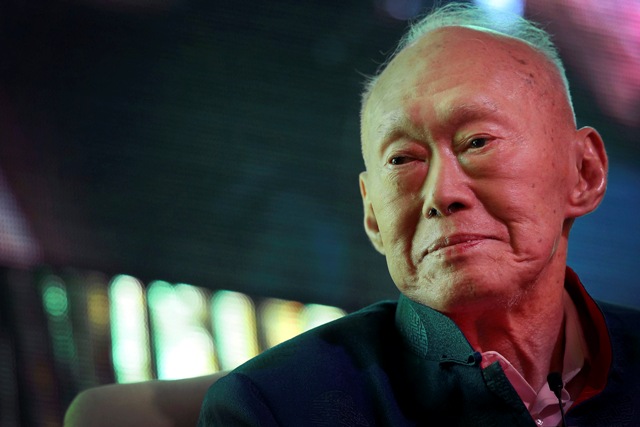15 things Lee Kuan Yew said about the Philippines
MANILA, Philippines — The death of Lee Kuan Yew on Monday reminded the world of the Singaporean founder's accomplishments before, during and after his term as prime minister.
Lee was hailed by the Philippines' foreign ministry as a "visionary statesman" and an inspiration to the world for building Singapore, formerly a sleepy port, "into an economic powerhouse and modern society."
During his life, Lee openly shared his thoughts about the world, nations, especially Singapore's neighbors, including the Philippines.
In his book "From Third World to First," Lee shared lessons on development, diplomacy, policy-making, history, culture and domestic affairs.
He also wrote about building Singapore's ties with the Philippines.
Lee recounted an event following the assassination of Senator Ninoy Aquino in 1983 and international outrage that resulted in foreign banks blocking all loans to the Philippines:
[Philippine President Ferdinand Marcos] sent his minister for trade and industry, Bobby Ongpin, to ask me for a loan of US$300—500 million to meet the interest payments. I looked him straight in the eye and said, 'Will never see that money back'.
On coup attempts during Corazon Aquino's presidency that discouraged inflow of investments, Lee wrote:
This was a pity because they had so many able people, educated in the Philippines and the United States. Their workers were English-speaking, at least in Manila. There was no reason why the Philippines should not have been one of the more successful of the ASEAN countries.
In the 1950s and 1960s, it was the most developed, because America had been generous in rehabilitating the country after the war. Something was missing, a gel to hold society together.
The people at the top, the elite mestizos, had the same detached attitude to the native peasants as the mestizos in their haciendas in Latin America had toward their peons.
They were two different societies: Those at the top lived a life of extreme luxury and comfort while the peasants scraped a living, and in the Philippines it was a hard living. They had no land but worked on sugar and coconut plantations.

In this March 20, 2013, file photo, Singapore's first Prime Minister Lee Kuan Yew attends the Standard Chartered Singapore Forum in Singapore.AP Wong Maye-E/File
Lee hailed President Fidel Ramos for being "more practical" than his predecessor.
In November 1992, I visited [Ramos]. In a speech to the 18th Philippine Business Conference, I said, 'I do not believe democracy necessarily leads to development. I believe what a country needs to develop is discipline more than democracy.' In private, President Ramos said he agreed with me that British parliamentary-type constitutions worked better because the majority party in the legislature was also the government. Publicly, Ramos had to differ.
Lee also criticized some factors that prevented the Philippines' progress:
Ramos knew well the difficulties of trying to govern with strict American-style separation of powers. The senate had already defeated Mrs. Aquino's proposal to retain the American bases. The Philippines had a rambunctious press but it did not check corruption. Individual press reporters could be bought, as could many judges.
The Singaporean leader also felt sorry for the Philippines' apparent brain drain.
Something had gone seriously wrong. Millions of Filipino men and women had to leave their country for jobs abroad beneath their level of education.
Filipino professionals whom we recruited to work in Singapore are as good as our own. Indeed, their architects, artists, and musicians are more artistic and creative than ours.
This is also how Lee described the Filipino people:
It is a soft, forgiving culture. Only in the Philippines could a leader like Ferdinand Marcos, who pillaged his country for over 20 years, still be considered for a national burial. Insignificant amounts of the loot have been recovered, yet his wife and children were allowed to return and engage in politics.
Some Filipinos write and speak with passion. If they could get their elite to share their sentiments and act, what could they not have achieved?
In an interview with Foreign Affairs magazine in March 1994, Lee had foreseen a continuous growth in East Asia, partly due to countries' lessons from wars.
One reason why growth is likely to last for many years in East Asia -- and this is just a guess -- is that the peoples and the governments of East Asia have learned some powerful lessons about the viciousness and destructiveness of wars. Not only full-scale wars like in Korea, but guerrilla wars as in Vietnam, in Cambodia and in the jungles of Malaysia, Thailand, Indonesia and the Philippines. We all know that the more you engage in conflict, the poorer and the more desperate you become.
In an April 2014 issue of Forbes magazine, Lee also wrote about the South China Sea dispute between the China and its smaller neighbors, including the Philippines.
The disputes, which arise from claims based on different principles, are unlikely to be resolved.
Lee explained that China does not see itself becoming a global leader without control of virtually the entire South China Sea, where a third of the world's trade passes through.
Much more is at stake than rocks and resources. China sees the South China Sea as one of its key interests. A rising China is asserting its position by claiming historical rights to these waters.
Lee said Philippine-initiated arbitration through the United Nations tribunal, meanwhile, is a juridical platform that major global powers such as China and the United States do not submit to.
A resurgent China isn't going to allow its sea boundaries to once again be decided by external parties.
- Latest
























